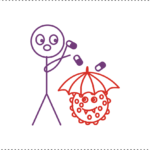Lien vers Pubmed [PMID] – 34597873
Lien DOI – S1879-6257(21)00107-310.1016/j.coviro.2021.09.009
Curr Opin Virol 2021 Sep; 51(): 56-64
Drug resistance mutations appear in HIV under treatment pressure. Resistant variants can be transmitted to treatment-naive individuals, which can lead to rapid virological failure and can limit treatment options. Consequently, quantifying the prevalence, emergence and transmission of drug resistance is critical to effectively treating patients and to shape health policies. We review recent bioinformatics developments and in particular describe: (1) the machine learning approaches intended to predict and explain the level of resistance of HIV variants from their sequence data; (2) the phylogenetic methods used to survey the emergence and dynamics of resistant HIV transmission clusters; (3) the impact of deep sequencing in studying within-host and between-host genetic diversity of HIV variants, notably regarding minority resistant variants.




